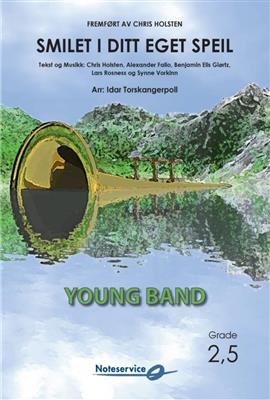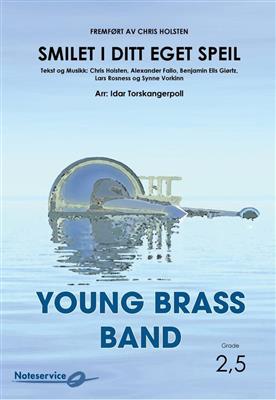Results
-
 £127.30
£127.30Var sang - Svein H. Giske
Our song was commissioned by Knarvik Skolekorps for their junior band in 2020. They wanted an original piece that could challenge their young players.This became a suite in three movements with themes that run through the whole piece.In the 2. movement there is a possibility for the band to sing in Song of friendship.. Young people finding friendship through music, as I myself have done, is one of the nicest things one can experience, in my opinion.Should you choose not to sing, you can just play the notes as printed.Svein H. Giske-September 2022-
Estimated dispatch 5-14 working days
Audio Player -
 £102.60
£102.60Smilet i ditt eget speil - Chris Holsten
Chris Holsten's song was one of Norway's most played in 2021 and is already a modern classic. In this song Holsten sings about his difficult childhood and lifts a most important issue, namely mental health. This is a warm pop-ballad with a well-sounding refrain that has set in the mind of many already.This piece is ideal for bands looking for Norwegian pop music with an instrumentation that suits most bands. The piece can be adapted by using soloists in sections and has repetitive patterns making it easy to learn.
Estimated dispatch 5-14 working days
Audio Player -
 £93.50
£93.50Smilet i ditt eget speil - Synne Vorkinn
Chris Holsten's song was one of Norway's most played in 2021 and is already a modern classic. In this song Holsten sings about his difficult childhood and lifts a most important issue, namely mental health. This is a warm pop-ballad with a well-sounding refrain that has set in the mind of many already.This piece is ideal for bands looking for Norwegian pop music with an instrumentation that suits most bands. The piece can be adapted by using soloists in sections and has repetitive patterns making it easy to learn.
Estimated dispatch 5-14 working days
-
 £115.60
£115.60S.O.S. - Björn Ulvaeus
When the publisher asked me to make an arrangement of an ABBA tune, S.O.S. was the first song I thought of. Its introduction and melody are well suited to play for Wind Band. Admittedly, the key had to be shifted to make it sound good for this instrumentation. To me, this is nostalgia, while for others, the Mamma Mia movie/show will be what they associate with this wonderful song. Apart from a few medleys, few of ABBA's songs are available to Wind Band. So, it was very fun to work on this classic.The arrangement is made quite simply to fit many sizes of Bands. Technically, it is also relatively simple both in range and rhythm. As you can see, there are many ways to adjust this arrangement to your own ensemble. Bring out melody lines and the bassline, and a lot is done. If needed, simplify to make it sound nice.Bjorn Morten Kjaernes
Estimated dispatch 5-14 working days
Audio Player -
 £79.99
£79.99Mamma Mia! - Björn Ulvaeus
On the 6th of April 1999, exactly 25 years after ABBA had won the Eurovision Song Contest with the song Waterloo, the musical Mamma Mia! opened in London. The funny and appealing love story, based on 22 ABBA classics, became an immediate success. Arranger Peter Kleine Schaars has selected five of the most famous titles from the musical, added the hit Waterloo and used his musical imagination. The result is a catchy ABBA medley that will appeal to young and old.
Estimated dispatch 5-14 working days
Audio Player -
£59.99
All Cried Out
At the beginning of the 1980s Alison Moyet was discovered by Vince Clarke, who - in search of greater independence - had left the successful band Depeche Mode. The soulful singing style of Moyet and the electronic, innovative pop that Clarke made melded well together in the group Yazoo with hits such as Only You and Don't Go. However, after a number of years Moyet went her own way and forged a solo career, during which she demonstrated a somewhat more traditional sound. She recorded several covers (such as The First Time I Ever Saw Your Face and That Ole Devil Called Love) but she also wrote fine songs herself, such as Love Resurrection and, of course, the expressive song AllCried Out. This arrangement by Peter Kleine Schaars does justice to the atmosphere of the original song.
Estimated dispatch 5-14 working days
Audio Player -
£54.99
Waterloo - Benny Andersson
The Swedish group ABBA had their decisive international breakthrough when the foursome won the Eurovision Song Contest on the 6th of April, 1974 with Waterloo. This cheerful song, with its driving beat and distinctive melody, has become a true pop classic, like many other ABBA hits. Roland Kernen has arranged Waterloo for brass band. It is an energetic piece that is a pleasure both to play and to listen to.
Estimated dispatch 5-14 working days
Audio Player -
£69.99
Far from Over
Staying Alive, starring John Travolta, was a hit film in 1983. The music for this great film was written by different composers and the soundtrack was recorded by various well-known artists, such as the Bee Gees. Frank Stallone (the brother of actor and director Sylvester Stallone) was also involved. He wrote the title song Far from Over. This song with its solid beat became a great success and was a number one hit practically all over the world. This arrangement for brass band is guaranteed to be a hit.
Estimated dispatch 5-14 working days
Audio Player -
 £60.99
£60.99Walking on Sunshine - Kimberley Rew
Walking on Sunshine has earned its place among the all-time favorite summer classics. Kimberley Rew, lead guitarist for the pop group Katrina and the Waves, wrote the song in 1985 and never looked back.Whether at a club or a cafe, everybody seems to smile when this song is heard. Bring sunshine to your next concert with Sefan Schwalgin's arrangement of this unforgettable classic!
Estimated dispatch 5-14 working days
Audio Player -
 £74.99
£74.99A Medieval Christmas - Philip Sparke
Christmas is full of customs and traditions, both old and new. This is especially evident in Christmas songs, some of which have been part of Christian worship for centuries. A Medieval Christmas combines three ancient melodies that are still popular around the world today. Philip Sparke chose Gaudete, a song of praise from the middle ages, Coventry Carol, an English song from the 14th century, and In dulci jubilo, which can also be traced back to the 14th century, to form this joyous suite.
Estimated dispatch 5-14 working days
